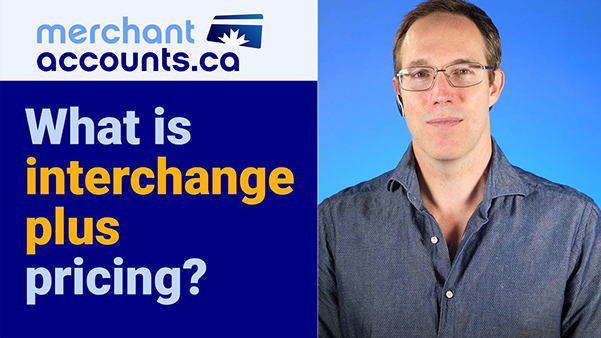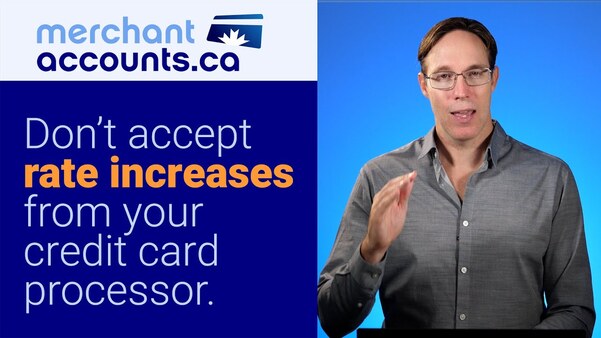February 14, 2023
by David Goodale
Canadian E-commerce Interchange Rates for 2023
(Slightly edited from video transcript for greater readability)
Key Takeaways
Hello David here at Merchant-Accounts.ca. Today I'm tackling the updated Canadian interchange rates for e-commerce merchants for January 2023. Stay tuned, we'll dig in in one second.
Interchange Rates Update
Interchange is typically updated once per year in April. While I'm recording this in January 2023, these rates will be good until April and they may be good across the remainder of the year. It's not possible to always know what changes are made to interchange. What is interchange? I have lots of other content on that, here is a short version: "Every time a merchant processes a transaction, your payment processor will charge you a rate, say 3% per transaction. They don't get to keep the 3% we have to pay Visa and Mastercard. All payment processors incur this cost from Visa Mastercard. The industry term used to describe that cost is called interchange." The type of card used, like a very basic card versus a fancy air miles card impacts the interchange cost. That is what we're going to explore today. Now I'm going to post some summarized charts and links taking you to the Canadian Visa and Mastercard interchange tables for 2023.
Visa
We'll start though with Visa. We're specifically looking at the "card not present" transactions. These are e-commerce transactions. Classic, Gold and Platinum cards have an interchange rate of 1.4%. Infinite Visa cards have an interchange rate of 1.65%. Infinite Privilege cards, which is like the fanciest level of Visa cards in Canada is 2.4%. That's quite an expensive card for merchants to process. Offsetting these high Interchange cards are debit cards. Debit cards are quite affordable. They have an interchange rate of 1.15% for corporate cards, which is a credit card that's issued to a company as it might say, John's Landscaping on the front rather than, John Smith the business owner. Examine the tables directly below.
| Fee Program | Classic, Gold, Platinum | Infinite | Visa Infinite Privilege |
|---|---|---|---|
| Card Not Present - Tokenized | 1.35% | 1.60% | 2.35% |
| Recurring Payments | 1.25% | 1.53% | 1.95% |
| Recurring Payments - Tokenized | 1.20% | 1.48% | 1.90% |
| Standard | 1.45% | 1.70% | 2.45% |
| Fee Program | Visa Debit |
|---|---|
| Recurring Payments | 0.60% |
| Standard | 1.15% |
Mastercard
Mastercard has business cards that have an interchange rate of 2%, we're going to be talking about the digital commerce tier of interchange, which is for e-commerce transactions. The Mastercard Core card, the basic Mastercard has an interchange rate of 1.67%. Mastercard World has an interchange rate of 1.9%. Mastercard World Elite is 2.13% and the Muse Mastercard is 2.25%. The fancier cards are the debit cards, which are the same as Visa at 1.15%. Now interestingly with Mastercard specifically, you can get lower interchange rates if you use 3DSecure, which is a great service. I have other content about 3DSecure, the very short version is it's a second step in the checkout process. If you put the customer through the second step, you cannot get a chargeback for fraud. It's a much more secure transaction. If you do that, Mastercard will reward you with a lower interchange rate. One last comment, with 3DSecure version two, the latest version of 3DSecure is usually frictionless. Most of your customers will not realize it was a 3DSecure transaction. It's quite a good product. Take a look at the table below to compare Mastercard interchange rates.
| Interchange Program Type | Core | World | World Elite | Muse Mastercard | Debit |
|---|---|---|---|---|---|
| Digital Commerce | 1.67% | 1.90% | 2.13% | 2.25% | |
| SecureCode / 3DS | 1.50% | 1.67% | 1.90% | 2.03% | |
| Standard | 1.15% |
Demographics
What you might also consider is what card types are going to be most popular for you. Think of your customer demographics. Are you doing consulting on how to get out of debt or are you renting private Lear jets? Well, if you're selling, you know, Rolexes and Rare Blue Diamonds, you're going to get a lot of the fancier cards. If you're doing targeting for maybe younger folks, a less wealthy demographic, you will get more basic cards and debit cards and that's going to be what you find when you break out your statement at the end of the month. There's one more thing that I want to talk about, which is card brand fees. All of the interchange fees that we just discussed, don't go to Visa or Mastercard, they go to the issuing bank that gave that card to the cardholder.
Some examples
Now, Visa and Mastercard earn fees too. Fortunately, their fee is very small. It's called the card brand fee. It is 0.09%. That's the part that goes to Visa and Mastercard. If we go back to the example of the Mastercard, let's just go with the basic Mastercard, 1.67%. Then you have to add on the 0.09% card brand fee for Mastercard, which is going to take you to 1.76%. That's your true all-in cost to a merchant. If you process a basic Mastercard and you pay more than 1.76%, which you probably will, you should because you have your payment processor has to earn something. That's the amount that the payment processor earning. Just as an example, if I had a merchant on a rate of interchange plus 1% and they processed a core, basic core Mastercard in Canada, the interchange cost would be 1.76%. We would add on our 1% and it would become 2.76%. That's the fee that you would pay as the merchant. Just for clarity, that's not our default rate. Merchant-Accounts.ca rates are quite a bit lower than that. I just used 1% because it was easy math and it seems easier for our viewers to digest and understand. I hope that was helpful.
Breakdown of example transaction fees |
|
|---|---|
| Card Brand Fee | 0.09% |
| Interchange (goes to card issuer) | 1.67% | Pament Processor Fee | 1.00% |
| Total Transaction Fee | 2.76% |
Conclusion
That's a very quick breakdown of interchange in Canada for 2023. Check out the links to the Visa and Mastercard interchange tables and we have lots of other very exciting interchange content if such a thing exists on our website at Merchant-Accounts.ca. Thanks for watching and have a nice stay there. Bye now.
Need professional guidance?
Contact us for a free one hour consultation.
Can I Help Lower Your Processing Fees?
If you found this content helpful, will you give me the opportunity to quote on your business?
View Rates











